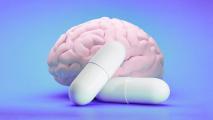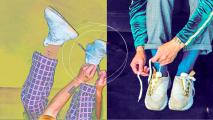
The Digital Frontier
Advancements in 20th century medicine reshaped society and made good health an expectation, not an exception. Now, 21st century breakthroughs may end disease, reverse aging, and restore sight and hearing — perhaps sooner than we think.
More
First-of-their-kind eye drops reverse blindness in teen
A topical gene therapy designed to heal the wounds of people with “butterfly skin disease” has now been used to reverse blindness.
By 2040, 60% of “meat” won’t come from dead animals
“Novel vegan meat alternatives” and cultured meat will likely become competitors to traditional meat products, the report says.
Crab shells boost the lifespan of zinc-ion batteries
A zinc-ion battery containing crab shells could serve as the foundation for future renewable energy storage systems.
How Big Tech breeds disinformation — and how we take back truth
Big Tech, big responsibilities. Here’s how keeping tech companies accountable can stop the spread of misinformation, and even save lives.
New clinical trial is testing a ketamine skin cream for PTSD
A topical ketamine treatment designed to alleviate the symptoms of PTSD without causing hallucinations has entered clinical trials.
4 ways to promote neurogenesis in your brain
Research from the 1960s proves creating new neurons as adults is possible, and modern-day research explains how to promote it.
New RSV shot protects babies against dangerous lung infections
The FDA has approved nirsevimab, an RSV shot that protects babies against the leading cause of infant hospitalizations in the US.
ADHD drugs could alleviate symptoms of Alzheimer’s
Scientists reviewed 40 years of clinical studies that assessed the effects of NA-targeting drugs, such as certain ADHD drugs, on Alzheimer’s.
Apple has reportedly built its own ChatGPT
Apple is reportedly exploring the potential of generative AI, but hasn’t decided how to incorporate the tech into its products yet.
Neuroscience research triggers revision of a leading theory of consciousness
A brain scanning study on unconsciously processed visual information disrupts a leading theory of consciousness: global workspace theory.
Radioactive drugs are transforming cancer treatment
Radiopharmaceuticals allow doctors to directly target patients’ cancer cells and avoid healthy tissue typically damaged by radiation therapy.
The mathematically correct way to tie your shoes
One of the great accomplishments of childhood comes when we successfully learn how to tie our own shoes: making a “bow” for the first time.
Got COVID but felt fine? It may be your genes.
A person’s chances of having asymptomatic COVID are dramatically increased if they possess a certain genetic mutation.
Startup aims to transplant pig hearts into kids in 2024
eGenesis hopes to transplant pig hearts from genetically engineered swine into young children with serious heart defects by 2024.
Fiber is your body’s natural guide to weight management
Fiber is important not just for happy bowel movements, but also for your blood sugar, weight, and overall health.
Innovation chief says “pressure test” your pet hypothesis. It’s guaranteed to be wrong.
His grandfather, a member of Oppenheimer’s atomic bomb team, foresaw the potential of nuclear energy to power cities – not destroy them. Today, Astro Teller is on a mission to harness innovation for good. Here’s how he’s doing it.
Series|
Hard Reset Podcast
Hard Reset Podcast: Buildings | Episode #2
We’re recycling our plastic, clothes, cans, and paper. Why can’t we recycle our buildings, too?
Lab-grown cotton is on its way to consumers
Cellular agriculture startup Galy has signed a deal that will make its lab-grown cotton available to consumers for the first time.
How an H.G. Wells sci-fi novel predicted Oppenheimer and atomic bombs
The “atomic bombs” in H.G. Wells’ 1914 novel The World Set Free influenced a pioneer of real-world nuclear weapons: physicist Leó Szilárd.
Subscribe to the newsletter






















